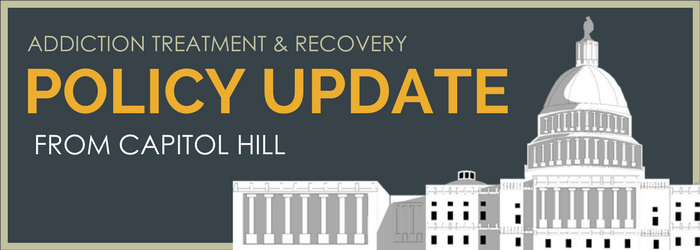
November 22, 2017 |
November 2017 Addiction Policy Update

Emergency Declaration
On October 26th, at a White House event the President directed the Department of Health and Human Services (HHS) to declare the opioid misuse and overdose epidemic a national public health emergency. Shortly thereafter, Acting HHS Secretary Hargan made the declaration official.
Many on and off Capitol Hill called the emergency declaration a “good first step,” but cited the need for more funding to fully address the epidemic as new funds or a request for new funds did not accompany the declaration. In a statement, Senator Capito (R-WV) said,
“Of course, the president’s action is just part of what must be a larger and broader national effort. Communities in West Virginia and across the country need more resources for recovery, treatment and enforcement, and it’s essential that we do what we can to provide the support they need. As a leader on the Appropriations Committee, I have worked hard to secure funding to fight the opioid epidemic on all fronts, and I will continue pushing and advocating for much-needed resources.”
As indicated by Senator Capito’s statement, the announcement has spurred advocacy on Capitol Hill for funding to address the epidemic. In press reports accompanying the announcement, Administration officials indicated they might make a request to Congress for more dollars. Additionally, on October 25th, Senators Markey (D-MA) and Casey (D-PA) introduced legislation to build on the funding in the 21st Century Cures Act by appropriating $45 billion annually through 2027.
While no new federal funds to address the epidemic accompanied the declaration, it does allow the Agencies to loosen certain regulations.
The declaration itself did not provide specifics on next steps the Administration might take, but Trump’s remarks and an accompanying fact sheet provided a sense for the Administration’s priorities. In Trump’s remarks some of the policies he mentioned included:
- A “massive advertising campaign” against drug abuse
- Quick approval of waivers submitted by states to waive the Institute of Mental Disease (IMD) prohibition on Medicaid reimbursement for treatment facilities with more than 16 beds (see subsequent announcement from the Centers for Medicare and Medicaid Services (CMS))
- A Food and Drug Administration (FDA) request for a high-risk opioid to be withdrawn from the market (presumably a reference to Opana)
Additionally, a White House fact sheet accompanying the declaration referenced greater use of telemedicine for medication assisted treatment (MAT) in rural areas, expedited federal hiring of specialists, Department of Labor funding for dislocated worker grants in states with high rates of opioid misuse, and re-directing funds from HIV/AIDs programs to help individuals eligible for those programs to receive substance use disorder treatment.
In closing the event, President Trump said, “the epidemic will get worse before it gets better, but get better it will. It is time to liberate our communities from this scourge of drug addiction…we can be the generation that ends the opioid epidemic.”
Commission Report
On November 1st, the Presidential Commission on Combating Drug Addiction and the Opioid Crisis released its final report.
The 56 recommendations in the report are non-binding and do not attach funding to implement the recommended policy changes. The Commission’s recommendations provided overarching themes such as providing state flexibility and block granting funding for all substance use disorder activities. This type of mega-block grant approach may not be one many on Capitol Hill will warm to given the consolidation of jurisdiction and programs this approach would require. Notwithstanding the lack of funding, many of the recommendations direct federal agencies to execute policy changes, including CMS, whose coverage and payment policies often drive private sector reimbursement. As important, a growing number of bi-partisan policymakers in Congress are considering introducing legislation and seeking funding for recommendations included in the report.
It remains unclear as of press time whether additional funding will be attached to an end of the year spending bill or other legislation, or the extent to which these recommendations will be acted upon by Congress.
This Policy Update was generously provided by Holly Strain & Carol McDaid of Capitol Decisions.

